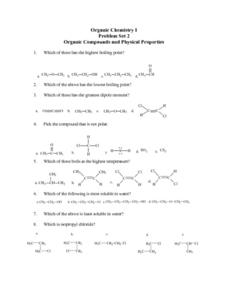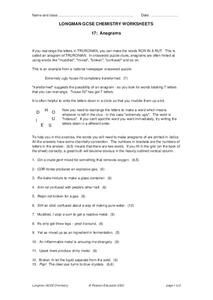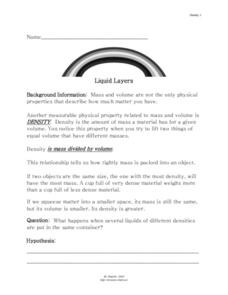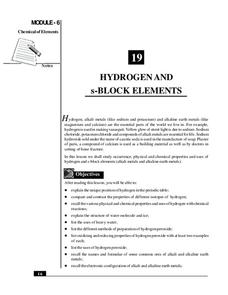Curated OER
Water Vapor Equilibrium
In this chemistry instructional activity, learners complete 12 short answer questions and problems on water vapor equilibrium. They calculate equilibrium concentrations of reactants and products.
Curated OER
Studying the Equilibrium of a Water System
In this equilibrium worksheet, students perform a computer simulation on vapor pressure of water at different temperatures to answer 11 problem solving and short answer questions about the topic.
Curated OER
Moles
In this moles worksheet, students review solubility, moles of solute, molar mass, and colligative properties. This worksheet has 10multiple choice questions and 11 problems to solve.
Curated OER
Organic Compounds and Physical Properties
In this chemistry worksheet, students identify which has the highest boiling point, as well as the lowest. Then they identify which compound is least soluble in water and why. Students also classify each of the compounds listed on the...
Pingry School
Qualitative Analysis of Eleven Household Chemicals
Chemical and physical properties give compounds an identity. Learners use the identity of a compound to predict what it is. By performing different tests like solubility, flame, heat, and reactions, individuals attempt to identify an...
Curated OER
Chemistry: States of Matter Quiz
For this chemistry worksheet, 11th graders take a states of matter quiz by matching 10 terms to their definitions, decide if 10 statements are true or false, and answer 2 fill in the blank questions.
Curated OER
Anagrams
In this chemistry worksheet, students complete a crossword puzzle by rearranging 13 anagrams about elements. They create their own anagrams from 3 given words.
It's About Time
Elements and Compounds
Young scientists use electrolysis to separate water into its elements before experimenting with fire to learn about their properties. A helpful resource provides a reading passage and analysis questions.
National Institute of Open Schooling
Solutions
Aqua regia, or royal water in Latin, is a solvent that can dissolve solid gold and platinum into a solution. Activity nine in a series of 36 allows classes to learn, through readings and answering questions, what a solution is and the...
Curated OER
What is in the Water?
In this mixtures worksheet, learners read about mixture and what determines if a solute dissolves in a solvent. They answer three questions about solutions and determine from a list of compounds which are soluble in water.
Curated OER
Mixed Review-Chemistry
In this chemistry review learning exercise, students answer a variety of questions about matter, elements, the kinetic theory, chemical and physical properties and the distillation process. They complete a concept map about matter.
National Institute of Open Schooling
The Liquid State
Due to surface tension, dew — a liquid, is spherical in shape. Learners explore the properties of liquids in activity seven in this series of 36. Beginning with its basic properties such as boiling point and moving through to surface...
Creative Chemistry
Displacement Reactions of the Halogens
During this lab activity, chemists discover the reactivities of chlorine, bromine, and iodine as examples of the halogens. They use a displacement reaction as a test by adding other compounds and observing for a color change. The lab...
Curated OER
Liquid Layers
In this density worksheet, students investigate what will happen when various liquids with different densities are put into the same container. They hypothesis and make observations. Students answer 4 questions about their investigation...
Curated OER
Review of Ionic and Covalent Compounds and Transitioning from Ionic to Covalent Compounds
Here is a unique assigment: compare and contrast ionic and covalent compounds in an extensive data table and then analyze Lewis dot structures in antoher. Three columns are to befilled in: "characteristic or feature," "applies to ionic...
Curated OER
Chemistry
In this chemistry worksheet, students describe an atom, its parts, the charges of these parts, and atoms life functions. Then they explain what the octet rule states for the placements of electrons around the nucleus of an atom. Students...
Curated OER
Chemistry Practice
In this chemistry practice worksheet, students select the correct response to the given questions. Students apply knowledge about the states of matter, finding vapor pressure and atmospheric pressure.
Creative Chemistry
Metals and Non-Metals
A half-page chart compares the properties of metals and nonmetals. Properties include appearance, melting and boiling point, density, strength, malleability, ductility, heat and electrical conductivity, and the nature of their oxides....
Curated OER
The Halogens
In this chemistry worksheet, students answer 24 questions related to properties of halogens. They fill in the table with the correct answers and participate in teacher demo.
Curated OER
Grow an Alum Crystal
What an exciting lab experiment to conduct with your high school chemistry class! Crystals are formed naturally in the environment. However, allow your blossoming chemists to create their own unique crystals using alum and...
Curated OER
GCSE Module 6 Revision Guide-Chemistry-Oil, Fossil Fuels and Earth's Atmosphere
In this oil, fossil fuels and Earth's atmosphere worksheet, students answer 3 questions about the origin of oil and its uses, the effects of burning oil and fossil fuels on the Earth's atmosphere and the origin and maintenance of the...
National Institute of Open Schooling
Hydrogen and s-Block Elements
Lesson 19 in the series of 36 analyzes the element hydrogen and the s-block elements. Through readings, answering questions, and discussion, learners write about and explain their occurrence, physical and chemical properties, and...
Curated OER
Chapter 12 Review, Section 1: Solutions
Here is a different approach to solutions: a worksheet that has chemistry learners use words to describe them! This is an outstanding exercise that will stretch learners to show what they know. They answer questions comparing solutions,...
National Institute of Open Schooling
Colloids
Classes explore colloids through readings and questions in lesson 10 in a series of 36. They learn everything from methods of preparation and properties to how to classify colloids. They finish the lesson by seeing how to apply...























